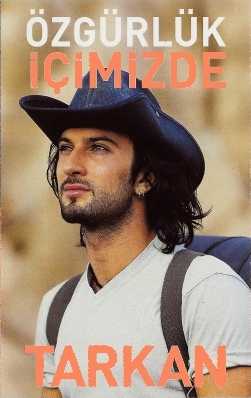Marketing and Music videos
In Turkish then album-oriented record market, it was not common the release of singles in order to promote the album. Instead, Tarkan recorded music videos for several of the album songs which were released gradually.
His first released video was "Kıl Oldum", in 21 December 1992. It was directed by Mert Özmen and had two versions, one with children and another with a monkey. In 3 February 1993 the video for "Kimdi?" was released. Directed by Cumhur Atalay and Metin Arolat, there were also two videos made for this track: one in which Tarkan is a post-officer and the other in which he is wearing yellow trousers, like in "Kıl Oldum"'s video.
After Tarkan's appearance at Elma show, on Teleon broadcasting channel, the album's sales skyrocketed and promotion increased. The third video released by the singer was for "Gelipte Halimi Gördün mü?", in 19 April 1993. In 6 June 1993 was the premiere of the video for "Vazgeçemem", which came to be one of his greatest hits. There were three videos made for this track: the one whose background is a fountain, another in which Tarkan sings in a restaurant, and a simple white backgrounded video. The CD with bonus tracks was released in 21 June 1993.
In 23 July 1993, the fifth video off the album was released: "Selam Ver". This was followed in 27 August 1993 by the video for "Çok Ararsın Beni (Remix)". An alternate video was filmed for the original version of the song to be released even before "Kıl Oldum", but it is rumoured that it was taken off air by Tarkan. Lastly, in 10 September 1993, a video for "Söz Verdim" was released. Also, "Sarıl Bana" and "Oldu Canım Ara Beni" were promoted on television and their videos received some airplay.

Tarkan Tevetoğlu is a German-born Turkish singer-songwriter. Since the early 1990s, with his successful albums, he has been a prominent figure of pop music, recognized both in Turkey and worldwide.

Dudu is a 2003 extended play album by Tarkan. This was his first album to be released through his own record label, HITT Music. It holds five songs and five remixes. The sales of the album exceeded 1 million copies worldwide. To support the album, beginning in November 2003 Tarkan gave solo performances in Turkey and other countries. In 2004 as part of Dudu World tour Tarkan visited Austria, Germany, France, United States, Ukraine, Russia, Finland, the Netherlands, Azerbaijan and Kazakhstan.

"Şımarık", also known as "Kiss Kiss", is a 1997 song by Turkish singer Tarkan. It was written by Sezen Aksu, with music credited as composed by Tarkan. However, Tarkan later admitted in a 2006 interview that this had been done without Aksu's consent, who was the true copyright owner. It formed part of Tarkan's third album, Ölürüm Sana (1997). "Şımarık" was released in France in 1998 and across the rest of the world in 1999 from the compilation album Tarkan, which was released in Europe.

Aacayipsin is the 1994 album of the Turkish pop singer Tarkan. The album was published in Europe and Asia. This was his second album, the success of which launched him as a superstar onto the Turkish pop scene with over 2.5 million copies sold worldwide.

Ölürüm Sana is Tarkan's third studio album, released on July 5, 1997. The album was distributed in both Europe and Asia. It sold about 3 million copies in Turkey. This album received very good reviews, becoming one of Turkey's best-selling albums, and played a heavy role in catapulting Tarkan to the status of 'Mega-Star'.

Tarkan is a 1999 compilation album by Tarkan, composed of songs released in his 1994 Aacayipsin and 1997 Ölürüm Sana albums. It was initially released in France in 1998 but due to the success of his single "Şımarık", it was given a wider European release on 1 April 1999, with 14 tracks. Due to its popularity it was re-released with 15 tracks on 27 September in the same year. The sales of this album won Tarkan a Monaco World Music Award.

"Özgürlük İçimizde" is a 2002 single by the Turkish pop singer Tarkan. It was released as part of Turkcell's advertising campaign and wasn't sold in stores separately. The campaign consisted of TV adverts, calendar and phone card designs, using the concept that a phone enables a person to travel free in nature and still keep in touch. This single was only released in cassette format.

Murat Boz is a Turkish singer, songwriter and actor.
Ozan Çolakoğlu is a Turkish composer, songwriter and music producer; famous for his work with various Turkish pop singers and his multiple film scores. He co-founded the production company Sarı Ev, but left it in 2010 to work for dB Müzik.

Metamorfoz (Metamorphosis) is the renowned Turkish pop singer Tarkan's sixth studio album, which was released on December 25, 2007, in Turkey. The album was published in Europe and Asia.

"Everyway That I Can" is a song recorded by Turkish singer Sertab Erener, with music composed by herself and Demir Demirkan, lyrics written by Demirkan, and production and arrangement by Ozan Çolakoğlu. It represented Turkey in the Eurovision Song Contest 2003, held in Riga, winning the contest. It was the first entry from Turkey in the contest that did not feature any Turkish lyrics.

Adimi Kalbine Yaz is Turkish pop singer Tarkan's studio album, and was released on 29 July 2010 in Turkey. The album sold more than 300,000 copies in the first week of its release and received the best album of the year award from Kral TV Music Awards.
"Salına Salına Sinsice" is the fourth single taken from Tarkan's 1997 album Ölürüm Sana. Lyrics and music were credited to Tarkan; although it was a much-loved song at the time of its release, there was some confusion as to who wrote it.
"Ölürüm Sana" was recorded in 1997 by Tarkan, named after the similarly named song Ölürüm Sana that is featured in the album. Its most popular song was "Şımarık", also known as "Kiss Kiss" in some countries. It sold 4 million copies worldwide, including 3 million sales in Turkey. "Şımarık", whose music and lyrics were both composed by Tarkan, found its place at number 1 in the Billboard Turkish Top 20 List of that year.

Dance Mix is the first remix album by Turkish singer Murat Boz. It was released by Dokuz Sekiz Müzik on 14 August 2012, his only remix album to be published by this company. The album features elements of electronic music, and is Boz's first major work since the 2011 release of his third studio album Aşklarım Büyük Benden. The album was produced by Ahmet Çelenk.

Beni Durdursan mı? is the eighth studio album by Turkish singer Gülşen. It was released on 20 February 2013 by Doğan Music Company, her first album to be released by this company. Following the release of Önsöz in 2009, Gülşen released the singles "Yeni Biri" and "Sözde Ayrılık" in 2011, and in the same year began working on a new album with Ozan Çolakoğlu. She wrote all of the songs herself and composed a number of them on her own, and composed the rest together with the album's producer Çolakoğlu. The recording was done in Istanbul in 2012, and lasted until the early months of 2013.

Bangır Bangır is the ninth studio album by Turkish singer Gülşen. It was released on 29 April 2015 by Doğan Music Company. Initial information about the album was first discussed in February 2014, and its release date was postponed as Gülşen wrote and composed songs for her colleagues. The recording began in the second half of 2014 at studios in Istanbul and London, and continued until early 2015. Like her previous album Beni Durdursan mı? (2013), Gülşen wrote and composed all of the songs on the album. The songs's arrangements were done by Ozan Çolakoğlu.
Ümit Sayın is a Turkish pop singer, composer and songwriter. Singer-songwriter Sezen Aksu, who was impressed by his voice at a concert in İzmir on 8 September 1990, and after performing a duet with him, she hired him as her backing vocalist. Sayın later worked as a backing vocalist for Harun Kolçak in 1992, Ajda Pekkan in 1993 and Tarkan in 1994–95. He began to write and compose songs in 1991 with the encouragement of Özkan Uğur and soon started to make songs for singers such as Harun Kolçak, Deniz Arcak, Emel Müftüoğlu, Erdal Çelik, Seden Gürel, Leman Sam, Hakan Peker, Burak Kut, İzel, Yeşim Salkım, Pınar Aylin, Suavi, Bendeniz, Tarkan, and Zeynep Dizdar. He continued his career successfully thanks to his musical relationship with Ozan Çolakoğlu. He released his self-titled debut album in 1992.

"Geççek" is a song of the Turkish singer Tarkan. Released in February 2022, it has garnered quite some attention not only from his fans, but also in the Turkish political spectrum, both, politicians from the Government as well as the opposition have commented on it due to speculations of alleged criticism on the current government. The song has been written by Tarkan himself, and inspired by the difficult times he experienced during the COVID-19 pandemic.

Güler Duman '94 is the twelfth album by Turkish folk music singer Güler Duman, released on February 22, 1994, by Duygu Music. Widely regarded as one of the definitive albums of the 1990s, it became a massive commercial success, selling over 260,000 copies and establishing itself as the best-selling Turkish folk music album of the year. Recording for the album began in August 1993 and took four months to complete, wrapping up in December of the same year. Güler Duman contributed to the album's creative process by writing the lyrics for one track and composing the music for two others. In addition, she performed works by influential artists such as Hasret Gültekin, Pir Sultan Abdal, Mahzuni Şerif and Musa Eroğlu. The video clip of the track "Türkülerle Gömün Beni" was also released with the album and had a positive effect on the sales of the album. On May 1, 1994, she released her second video clip titled "Güle Yel Değdi" with lyrics and music by Hasret Gültekin.
















